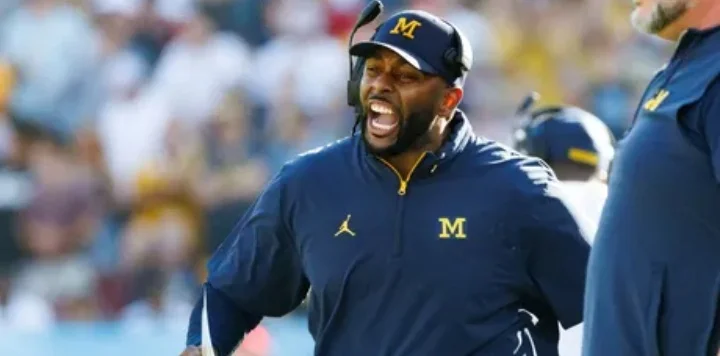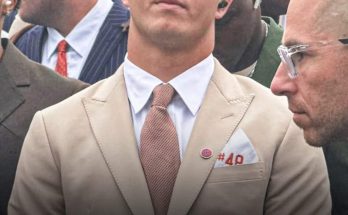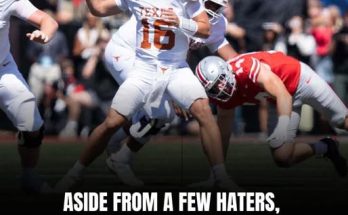Michigan Vows to Fight “Unfair and Draconian” Sign-Stealing Penalties with Unwavering Defiance After Criticizing the NCAA for Their “Unprecedented Power Grab”
In the wake of the NCAA’s recent announcement of severe penalties against the University of Michigan’s football program for allegations of sign-stealing, a firestorm of controversy has erupted, with the Wolverines vowing to challenge what they have called an “unprecedented power grab” by the governing body. Michigan officials, players, and coaches have expressed unwavering defiance, citing what they perceive as an unfair and overly harsh response to practices they argue are common throughout college football. This dispute over the NCAA’s actions is not only setting the stage for a potential legal battle but also calling into question the very foundations of how the NCAA polices its member institutions.
The Allegations: Sign-Stealing or Standard Practice?
The NCAA’s charges against Michigan revolve around allegations that the Wolverines football program illegally stole signs from opposing teams, a practice that is technically against the rules but not necessarily unprecedented in the world of college football. Sign-stealing involves deciphering the hand signals or other forms of communication used by opposing teams to relay plays, then attempting to use that knowledge to gain a competitive advantage.
While the practice has been long regarded as part of the “gamesmanship” of the sport, it is the manner in which Michigan allegedly went about it that has raised the ire of the NCAA. According to the governing body, Michigan’s sign-stealing was done on an extensive and coordinated scale, far beyond what would be considered typical or acceptable within the sport. Specifically, it was reported that Michigan’s coaching staff utilized scouts to attend games of opposing teams and record their signals, with the intention of breaking them down and using them during Michigan’s matchups against those teams.
However, critics of the NCAA’s investigation argue that sign-stealing is a widely acknowledged part of college football culture. They point out that many teams, including some of the NCAA’s most prestigious programs, engage in similar practices. In fact, some experts in college football believe that this is simply a case of the NCAA cracking down on Michigan for a practice that is often overlooked when done in a less overt manner.
Despite the uproar surrounding the accusations, Michigan has maintained that the alleged violations were not as severe as the NCAA claims, with university officials emphasizing that the actions taken by the team were both routine and done with the understanding that they were within the boundaries of what was acceptable in the sport.
The NCAA’s Response: Power Grab or Necessary Enforcement?
In response to the charges, the NCAA issued a series of sanctions against Michigan, including a significant fine, a ban on bowl game participation, and the loss of scholarships for incoming players. Additionally, Michigan’s head coach, Jim Harbaugh, was suspended for several games, and the program was placed on probation. The penalties have been described as “draconian” by Michigan officials, who believe that the punishment far exceeds the nature of the offense.
The NCAA, for its part, has defended its actions as a necessary step in maintaining the integrity of college sports. According to NCAA President Charlie Baker, the organization is committed to ensuring that all teams compete on a level playing field, free from any unfair advantages that could undermine the spirit of the game. Baker has argued that Michigan’s actions went beyond simple gamesmanship and represented an egregious violation of the NCAA’s rules, justifying the harsh penalties.
In a statement, Baker expressed the NCAA’s intention to send a strong message to all member institutions that sign-stealing—especially when carried out systematically—is unacceptable and will be met with severe consequences. “This is not just about Michigan,” Baker said. “This is about ensuring that every team has a fair chance to compete and that no program has an unfair edge due to illegal tactics.”
However, Michigan and its supporters view the NCAA’s decision as part of a broader trend of overreach and excessive power by the governing body. They argue that the NCAA has too often stepped in to impose sweeping sanctions on schools and programs that it deems to be in violation of its policies, even when the alleged infractions are relatively minor or commonplace within the sport.
To many at Michigan, the penalties against their football program are a glaring example of this “unprecedented power grab.” University officials have contended that the NCAA’s actions are not only unwarranted but also show a disregard for the nuances of the college football landscape, where practices like sign-stealing are routinely engaged in without significant consequence.
Michigan’s Response: Defiance and Legal Challenges
Michigan’s reaction to the NCAA’s penalties has been swift and forceful. University president Santa Ono and athletic director Warde Manuel have both publicly vowed to fight the sanctions “tooth and nail.” According to a statement released by the university, Michigan will explore all legal avenues available to challenge the penalties, including the possibility of filing a lawsuit against the NCAA for what they see as a violation of the university’s rights.
The statement from Michigan officials expressed their belief that the NCAA’s investigation into the sign-stealing allegations was flawed and biased. They argue that the governing body’s findings are based on incomplete or inaccurate information, and that the penalties imposed are disproportionate to the actions of the Michigan football program. The university has also raised concerns about the lack of transparency in the NCAA’s investigation and the fairness of the process that led to the penalties.
Michigan has signaled its intent to file an appeal with the NCAA, which could potentially lead to a lengthy legal battle. If the case escalates to court, the outcome could have far-reaching implications for the way the NCAA operates and enforces its rules. A legal precedent set by a case involving Michigan could reshape how the organization handles future investigations and sanctions, particularly when it comes to practices that may not have been thoroughly scrutinized in the past.
In the meantime, the University of Michigan has vowed to continue competing at the highest level, despite the sanctions. Coach Harbaugh, though suspended for a number of games, has reiterated his commitment to leading the Wolverines to success and supporting his players through what he describes as a “difficult and unjust” situation.
“We will not be intimidated, and we will not back down,” Harbaugh said in a press conference following the announcement of the penalties. “This is a fight for fairness, and we’re going to stand our ground.”
The message from Michigan is clear: they view the NCAA’s penalties as a direct attack on the integrity of their football program and are prepared to go to great lengths to defend their honor and reputation.
Public Reactions: Support for Michigan and Criticism of the NCAA
The penalties against Michigan have sparked a range of reactions across the college football landscape, with many fans, analysts, and even rival coaches weighing in on the controversy. While some supporters of the NCAA argue that the penalties were justified, a significant portion of the college football community has rallied behind Michigan in its defiance.
Many fans view the NCAA’s actions as a heavy-handed attempt to maintain control over college sports, often to the detriment of the athletes, coaches, and programs that make the sport what it is. Supporters of Michigan’s position argue that sign-stealing is not only an accepted part of the game but also something that is often overlooked by the NCAA unless it becomes a major headline. They point to the fact that the NCAA has been inconsistent in its enforcement of such rules, with other programs being given little more than a slap on the wrist for similar offenses.
Furthermore, some critics of the NCAA argue that the organization has become far too focused on punishing individual programs while allowing larger systemic issues within college sports to go unchecked. This includes concerns about player compensation, the treatment of student-athletes, and the growing commercialization of college athletics. In this context, the harsh penalties against Michigan have become emblematic of the larger frustration with the NCAA’s perceived priorities.
For its part, Michigan has garnered support from many within the Big Ten and across the broader college football landscape. Several coaches have spoken out in favor of the Wolverines, expressing solidarity with the program’s decision to challenge the NCAA’s ruling. Some have argued that the penalties imposed on Michigan set a dangerous precedent for other teams in the future and could have a chilling effect on the competitive nature of college football.
What Lies Ahead for Michigan and the NCAA?
As Michigan prepares to battle the NCAA in court and through the appeals process, the future of both the university’s football program and the NCAA’s authority hangs in the balance. If Michigan is successful in its legal challenges, it could not only reduce or eliminate the penalties imposed on the team but also set a powerful precedent that could force the NCAA to rethink its approach to policing college football.
At the same time, the ongoing dispute may lead to broader discussions about the fairness of NCAA rules and the way the organization governs its member institutions. The case has already highlighted significant concerns about the power dynamics between the NCAA and the schools it oversees, and it could prompt a reevaluation of how the governing body operates in the future.
For now, the University of Michigan remains steadfast in its commitment to defending its program, and the college football world watches closely to see how this controversy will unfold. Whatever the outcome, one thing is certain: Michigan’s defiance in the face of the NCAA’s penalties will likely reverberate throughout college sports for years to come.



